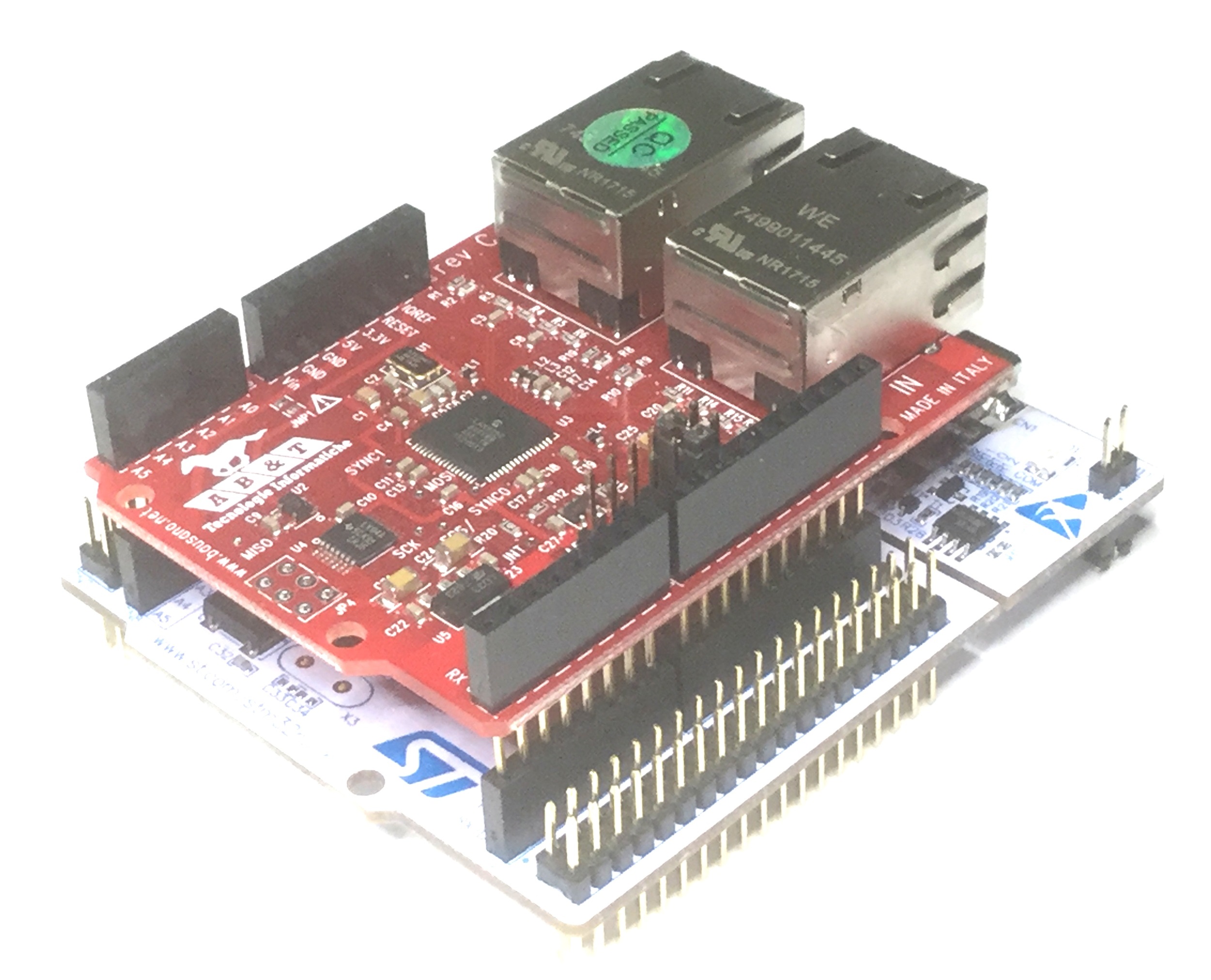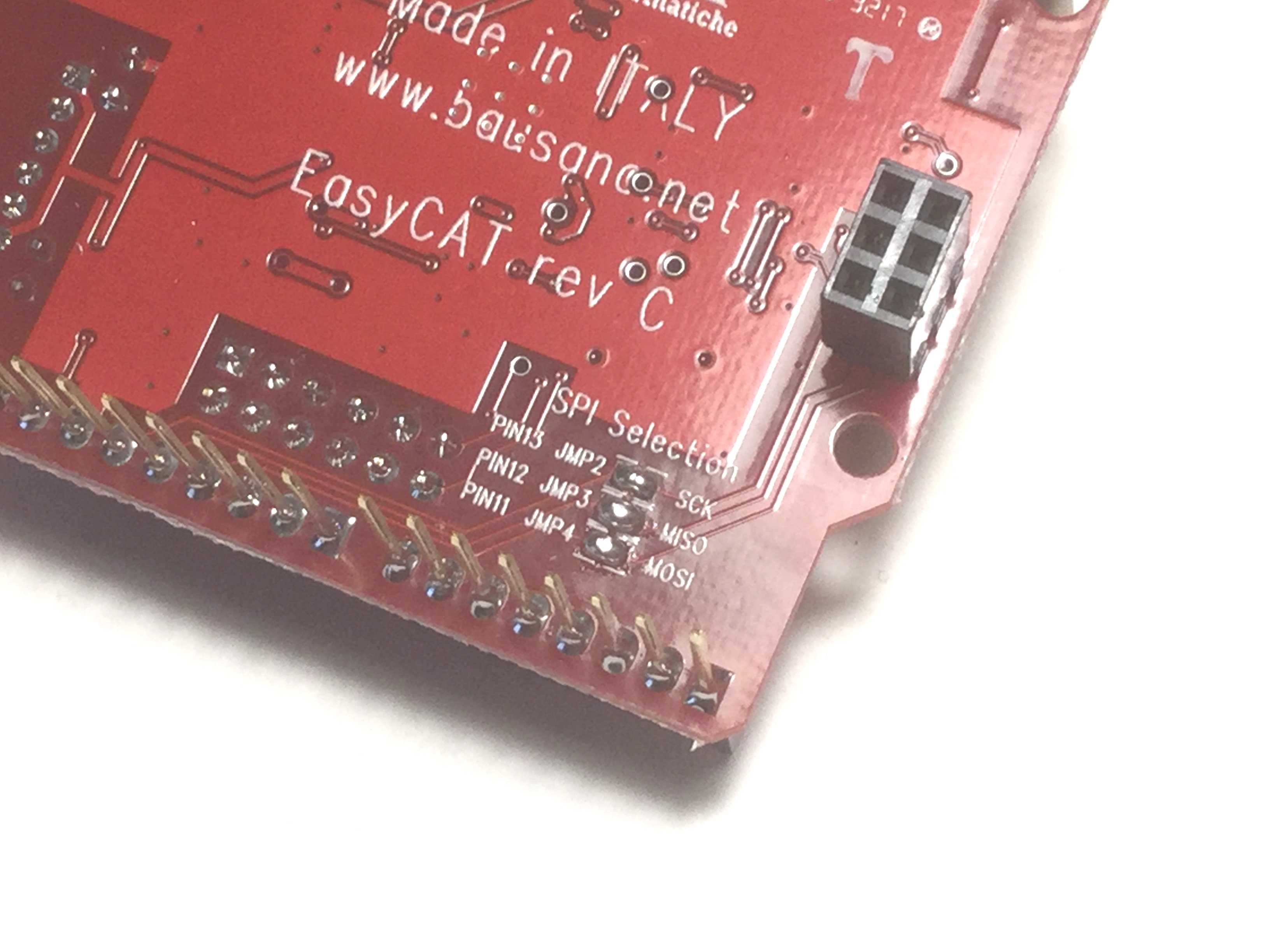EasyCAT shield library - It allows you to make an EtherCAT slave
Dependents: TestEasyCAT_SM_sync TestEasyCAT_LoopBack TestEasyCAT_DC_sync TestEasyCAT
The EasyCAT Shield and  boards
boards

- The EasyCAT Shield is an Arduino shield, designed and manufactured in Italy by AB&T Tecnologie Informatiche, that allow us to build a custom EtherCAT® slave in an easy way.
- This is the EasyCAT product page on the EtherCAT® Technology Group website.
- The EasyCAT Shield uses the 3x2 SPI connector to communicate with the microcontroller. This connector is standard on all the Arduino boards but some Arduino compatible boards don’t provide it. In this case, the SPI signal are always present on pins 13,12,and 11. Some examples of this boards are the STM32 Nucleo and the NXP LPCXpresso, part of the Mbed ecosystem.
- To address this issue in the EasyCAT Shield revision “C” there are three solder jumpers, on the bottom side of the board, that allow us to connect the SPI signals, SCK,MISO and MOSI, also on pins 13, 12 and 11.

- For your convenience the EasyCAT Shield can be ordered with the three solder jumpers already bridged and with the 3x2 connector not installed on the board. To request this option select EasyCAT spi_on_13_12_11 in the webshop.
Import libraryEasyCAT_lib
EasyCAT shield library - It allows you to make an EtherCAT slave
EasyCAT.h
- Committer:
- EasyCAT
- Date:
- 2017-09-12
- Revision:
- 0:7816b38c99cc
File content as of revision 0:7816b38c99cc:
//********************************************************************************************
// *
// AB&T Tecnologie Informatiche - Ivrea Italy *
// http://www.bausano.net *
// https://www.ethercat.org/en/products/791FFAA126AD43859920EA64384AD4FD.htm *
// *
//********************************************************************************************
// *
// This software is distributed as an example, in the hope that it could be useful, *
// WITHOUT ANY WARRANTY, even the implied warranty of FITNESS FOR A PARTICULAR PURPOSE *
// *
//********************************************************************************************
//----- EasyCAT library for mbed boards 170912 ----------------------------------------------
//----- Derived from the AB&T EasyCAT Arduino shield library V 1.5 --------------------------
//----- Tested with the STM32 NUCLEO-F767ZI board -------------------------------------------
#ifndef EasyCAT_H
#define EasyCAT_H
//****** PDO configuration parameters ********************************************************
// Here we can define how many I/O bytes our EasyCAT can exchange
// We can use STANDARD MODE or CUSTOM MODE
// !!! Warning: CUSTOM MODE is recommended only for advanced users !!!
// In STANDARD MODE the EasyCAT exchanges a fixed number of bytes
// in input and in output
// The number of bytes in input are equal to the number of bytes in output
// Valid values are 16, 32, 64, 128
//
// The configuration EEPROM on board of the EasyCAT must be
// loaded with the corresponding bin file, provided by AB&T
//
// The EasyCAT is shipped configured for 32+32 bytes I.E. with
// the "EasyCAT_32_32.bin" file loaded into the configuration EEPROM
//-- BYTE_NUM ----------- Byte exchanged ------ Config EEPROM file
//#define BYTE_NUM 16 // 16 + 16 EasyCAT_16_16.bin
#define BYTE_NUM 32 // 32 + 32 EasyCAT_32_32.bin
//#define BYTE_NUM 64 // 64 + 64 EasyCAT_64_64.bin
//#define BYTE_NUM 128 // 128 + 128 EasyCAT_128_128.bin
// In CUSTOM MODE, recommended only for advanced users, the EasyCAT exchanges
// a configurable number of bytes, between 0 and 128, in input and in output
// The number of bytes in input and in output can be different
//
// The configuration EEPROM on board of the EasyCAT must be
// loaded with a suitable bin file, provided by the user
// or with the "EasyCAT_configurable.bin" file provided by AB&T
// Comment all the above BYTE_NUM #define for the STANDARD MODE
// and define here the custom number of exchanged bytes
//----- CUSTOM_MODE example -------
//
//#define CUST_BYTE_NUM_OUT 49 // total number of bytes in output
//#define CUST_BYTE_NUM_IN 17 // total number of bytes in input
// We can also customize names and data types for the PDOs
// see the example in this file (look for tag "Custom data types example")
//*************************************************************************************
//-- the preprocessor calculates the parameters necessary to transfer out data ---
// define TOT_BYTE_NUM_OUT as the total
// number of byte you need to
// transfer in output (between 0 and 128)
// this must match your ESI XML
#ifdef BYTE_NUM
#define TOT_BYTE_NUM_OUT BYTE_NUM // bytes in output
#else
#define TOT_BYTE_NUM_OUT CUST_BYTE_NUM_OUT // any number between 0 and 128
#endif
#if ((TOT_BYTE_NUM_OUT & 0x03) != 0x00) // number of bytes in output
#define TOT_BYTE_NUM_ROUND_OUT ((TOT_BYTE_NUM_OUT | 0x03) + 1)
#else // rounded to 4 (long)
#define TOT_BYTE_NUM_ROUND_OUT TOT_BYTE_NUM_OUT //
#endif //
#if TOT_BYTE_NUM_OUT > 64 // if we have more then 64 bytes
// we have to split the transfer in two
#define SEC_BYTE_NUM_OUT (TOT_BYTE_NUM_OUT - 64) // number of bytes of the second transfer
#if ((SEC_BYTE_NUM_OUT & 0x03) != 0x00) // number of bytes of the second transfer
#define SEC_BYTE_NUM_ROUND_OUT ((SEC_BYTE_NUM_OUT | 0x03) + 1)
#else // rounded to 4 (long)
#define SEC_BYTE_NUM_ROUND_OUT SEC_BYTE_NUM_OUT//
#endif //
#define SEC_LONG_NUM_OUT SEC_BYTE_NUM_ROUND_OUT/4// number of long of the second transfer
#define FST_BYTE_NUM_OUT 64 // number of bytes of the first transfer
#define FST_BYTE_NUM_ROUND_OUT 64 // number of bytes of the first transfer
// rounded to 4 (long)
#define FST_LONG_NUM_OUT 16 // number of long of the second transfer
#else // if we have 64 bytes max we tranfert
// them in just one round
#define FST_BYTE_NUM_OUT TOT_BYTE_NUM_OUT // number of bytes of the first and only transfer
#if ((FST_BYTE_NUM_OUT & 0x03) != 0x00) // number of bytes of the first and only transfer
#define FST_BYTE_NUM_ROUND_OUT ((FST_BYTE_NUM_OUT | 0x03) + 1)
#else // rounded to 4 (long)
#define FST_BYTE_NUM_ROUND_OUT FST_BYTE_NUM_OUT
#endif
#define FST_LONG_NUM_OUT FST_BYTE_NUM_ROUND_OUT/4// number of long of the first and only transfer
#define SEC_BYTE_NUM_OUT 0 // we don't use the second round
#define SEC_BYTE_NUM_ROUND_OUT 0 //
#define SEC_LONG_NUM_OUT 0 //
#endif
//-- the preprocessor calculates the parameters necessary to transfer in data ---
// define TOT_BYTE_NUM_IN the total
// number of byte you need to
// transfer in input (between 0 and 128)
#ifdef BYTE_NUM
#define TOT_BYTE_NUM_IN BYTE_NUM // bytes in input
#else
#define TOT_BYTE_NUM_IN CUST_BYTE_NUM_IN // any number between 0 and 128
#endif
#if ((TOT_BYTE_NUM_IN & 0x03) != 0x00) // number of bytes in output
#define TOT_BYTE_NUM_ROUND_IN ((TOT_BYTE_NUM_IN | 0x03) + 1)
#else // rounded to 4 (long)
#define TOT_BYTE_NUM_ROUND_IN TOT_BYTE_NUM_IN //
#endif //
#if TOT_BYTE_NUM_IN > 64 // if we have more then 64 bytes
// we have to split the transfer in two
#define SEC_BYTE_NUM_IN (TOT_BYTE_NUM_IN - 64) // number of bytes of the second transfer
#if ((SEC_BYTE_NUM_IN & 0x03) != 0x00) // number of bytes of the second transfer
#define SEC_BYTE_NUM_ROUND_IN ((SEC_BYTE_NUM_IN | 0x03) + 1)
#else // rounded to 4 (long)
#define SEC_BYTE_NUM_ROUND_IN SEC_BYTE_NUM_IN //
#endif //
#define SEC_LONG_NUM_IN SEC_BYTE_NUM_ROUND_IN/4 // number of long of the second transfer
#define FST_BYTE_NUM_IN 64 // number of bytes of the first transfer
#define FST_BYTE_NUM_ROUND_IN 64 // number of bytes of the first transfer
// rounded to 4 (long)
#define FST_LONG_NUM_IN 16 // number of long of the second transfer
#else // if we have 64 bytes max we tranfert
// them in just one round
#define FST_BYTE_NUM_IN TOT_BYTE_NUM_IN // number of bytes of the first and only transfer
#if ((FST_BYTE_NUM_IN & 0x03) != 0x00) // number of bytes of the first and only transfer
#define FST_BYTE_NUM_ROUND_IN ((FST_BYTE_NUM_IN | 0x03) + 1)
#else // rounded to 4 (long)
#define FST_BYTE_NUM_ROUND_IN FST_BYTE_NUM_IN
#endif
#define FST_LONG_NUM_IN FST_BYTE_NUM_ROUND_IN/4 // number of long of the first and only transfer
#define SEC_BYTE_NUM_IN 0 // we don't use the second round
#define SEC_BYTE_NUM_ROUND_IN 0 //
#define SEC_LONG_NUM_IN 0 //
#endif
//---------------------------------------------------------------------------------
//----------------- sanity check -------------------------------------------------------
#ifdef BYTE_NUM // STANDARD MODE and CUSTOM MODE
// cannot be defined at the same time
#ifdef CUST_BYTE_NUM_OUT
#error "BYTE_NUM and CUST_BYTE_NUM_OUT cannot be defined at the same time !!!!"
#error "define them correctly in file EasyCAT.h"
#endif
#ifdef CUST_BYTE_NUM_IN
#error "BYTE_NUM and CUST_BYTE_NUM_IN cannot be defined at the same time !!!!"
#error "define them correctly in file EasyCAT.h"
#endif
#endif
#ifdef BYTE_NUM //--- for BYTE_NUM we accept only 16 32 64 128 --
#if ((BYTE_NUM !=16) && (BYTE_NUM !=32) && (BYTE_NUM !=64) && (BYTE_NUM !=128))
#error "BYTE_NUM must be 16, 32, 64 or 128 !!! define it correctly in file EasyCAT.h"
#endif
#else
//--- CUST_BYTE_NUM_OUT and CUST_BYTE_NUM_IN --------
// must be max 128
#if (CUST_BYTE_NUM_OUT > 128)
#error "CUST_BYTE_NUM_OUT must be max 128 !!! define it correctly in file EasyCAT.h"
#endif
#if (CUST_BYTE_NUM_IN > 128)
#error "CUST_BYTE_NUM_IN must be max 128 !!! define it correctly in file EasyCAT.h"
#endif
#endif
//*************************************************************************************************
//---- LAN9252 registers --------------------------------------------------------------------------
//---- access to EtherCAT registers -------------------
#define ECAT_CSR_DATA 0x0300 // EtherCAT CSR Interface Data Register
#define ECAT_CSR_CMD 0x0304 // EtherCAT CSR Interface Command Register
//---- access to EtherCAT process RAM -----------------
#define ECAT_PRAM_RD_ADDR_LEN 0x0308 // EtherCAT Process RAM Read Address and Length Register
#define ECAT_PRAM_RD_CMD 0x030C // EtherCAT Process RAM Read Command Register
#define ECAT_PRAM_WR_ADDR_LEN 0x0310 // EtherCAT Process RAM Write Address and Length Register
#define ECAT_PRAM_WR_CMD 0x0314 // EtherCAT Process RAM Write Command Register
#define ECAT_PRAM_RD_DATA 0x0000 // EtherCAT Process RAM Read Data FIFO
#define ECAT_PRAM_WR_DATA 0x0020 // EtherCAT Process RAM Write Data FIFO
//---- EtherCAT registers -----------------------------
#define AL_STATUS 0x0130 // AL status
#define WDOG_STATUS 0x0440 // watch dog status
#define AL_EVENT_MASK 0x0204 // AL event interrupt mask
//---- LAN9252 registers ------------------------------
#define HW_CFG 0x0074 // hardware configuration register
#define BYTE_TEST 0x0064 // byte order test register
#define RESET_CTL 0x01F8 // reset register
#define ID_REV 0x0050 // chip ID and revision
#define IRQ_CFG 0x0054 // interrupt configuration
#define INT_EN 0x005C // interrupt enable
//---- LAN9252 flags ------------------------------------------------------------------------------
#define ECAT_CSR_BUSY 0x80
#define PRAM_ABORT 0x40000000
#define PRAM_BUSY 0x80
#define PRAM_AVAIL 0x01
#define READY 0x08
#define DIGITAL_RST 0x00000001
//---- EtherCAT flags -----------------------------------------------------------------------------
// EtherCAT state machine
#define ESM_INIT 0x01 // init
#define ESM_PREOP 0x02 // pre-operational
#define ESM_BOOT 0x03 // bootstrap
#define ESM_SAFEOP 0x04 // safe-operational
#define ESM_OP 0x08 // operational
//--- ESC commands --------------------------------------------------------------------------------
#define ESC_WRITE 0x80
#define ESC_READ 0xC0
//---- SPI ----------------------------------------------------------------------------------------
#define COMM_SPI_READ 0x03
#define COMM_SPI_WRITE 0x02
#define DUMMY_BYTE 0xFF
//---- typedef ------------------------------------------------------------------------------------
typedef union
{
unsigned short Word;
unsigned char Byte[2];
} UWORD;
typedef union
{
unsigned long Long;
unsigned short Word[2];
unsigned char Byte[4];
} ULONG;
typedef union //-- output buffer -----------------
{ //
uint8_t Byte [TOT_BYTE_NUM_ROUND_OUT]; //
#if CUST_BYTE_NUM_OUT > 0 //----- Custom data types example -----
/* //
struct // Here we can define our custom
{ // data types and names for the outputs
//
uint8_t Control; // The total number of bytes declared
float PreZone1; // in this structure must be equal
float CommZone1; // to the value assigned to CUST_BYTE_NUM_OUT
float RampZone1; //
float PreZone2; // In this case 1+ 4+4+4+ 4+4+4+ 4+4+4+ 4+4+4 = 49
float CommZone2; //
float RampZone2; //
float PreZone3; //
float CommZone3; //
float RampZone3; //
float PreZone4; //
float CommZone4; //
float RampZone4; //
}Cust; //
*/ //
#endif //
} PROCBUFFER_OUT; //
typedef union //-- input buffer ------------------
{ //
uint8_t Byte [TOT_BYTE_NUM_ROUND_IN]; //
#if CUST_BYTE_NUM_IN > 0 //----- Custom data types example ------
/* //
struct // Here we can define our custom
{ // data types and names for the inputs
//
uint8_t Status; // The total number of bytes declared
float TempZone1; // in this structure must be equal
float TempZone2; // to the value assigned to CUST_BYTE_NUM_IN
float TempZone3; //
float TempZone4; // In this case 1+ 4+4+4+4 = 17
}Cust; //
*/ //
#endif //
} PROCBUFFER_IN; //
typedef enum
{
ASYNC,
DC_SYNC,
SM_SYNC
}SyncMode;
//-------------------------------------------------------------------------------------------------
class EasyCAT
{
public:
EasyCAT(); // default constructor
EasyCAT(PinName SCS);
EasyCAT(SyncMode Sync);
EasyCAT(PinName SCS, SyncMode Sync);
unsigned char MainTask(); // EtherCAT main task
// must be called cyclically by the application
bool Init(); // EasyCAT board initialization
PROCBUFFER_OUT BufferOut; // output process data buffer
PROCBUFFER_IN BufferIn; // input process data buffer
private:
void SPIWriteRegisterDirect (unsigned short Address, unsigned long DataOut);
unsigned long SPIReadRegisterDirect (unsigned short Address, unsigned char Len);
void SPIWriteRegisterIndirect (unsigned long DataOut, unsigned short Address, unsigned char Len);
unsigned long SPIReadRegisterIndirect (unsigned short Address, unsigned char Len);
void SPIReadProcRamFifo();
void SPIWriteProcRamFifo();
PinName SCS_;
SyncMode Sync_;
};
#endif


